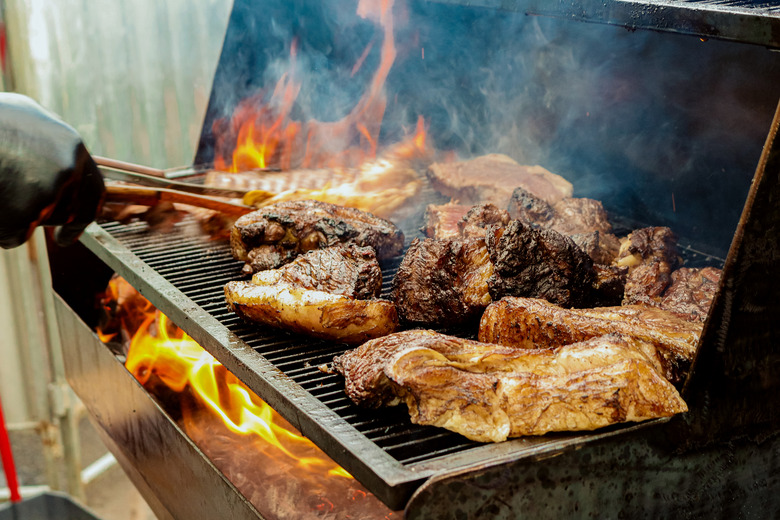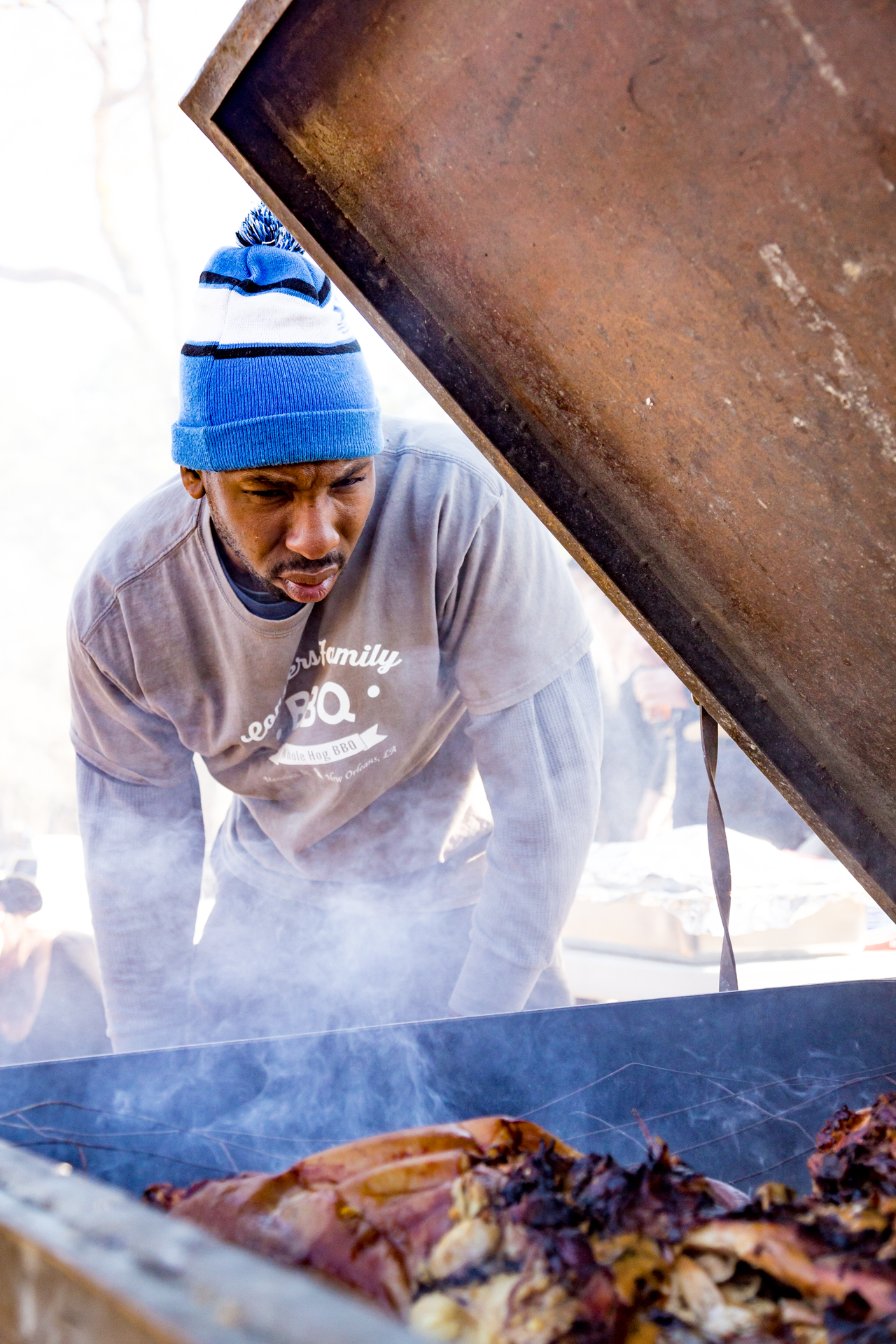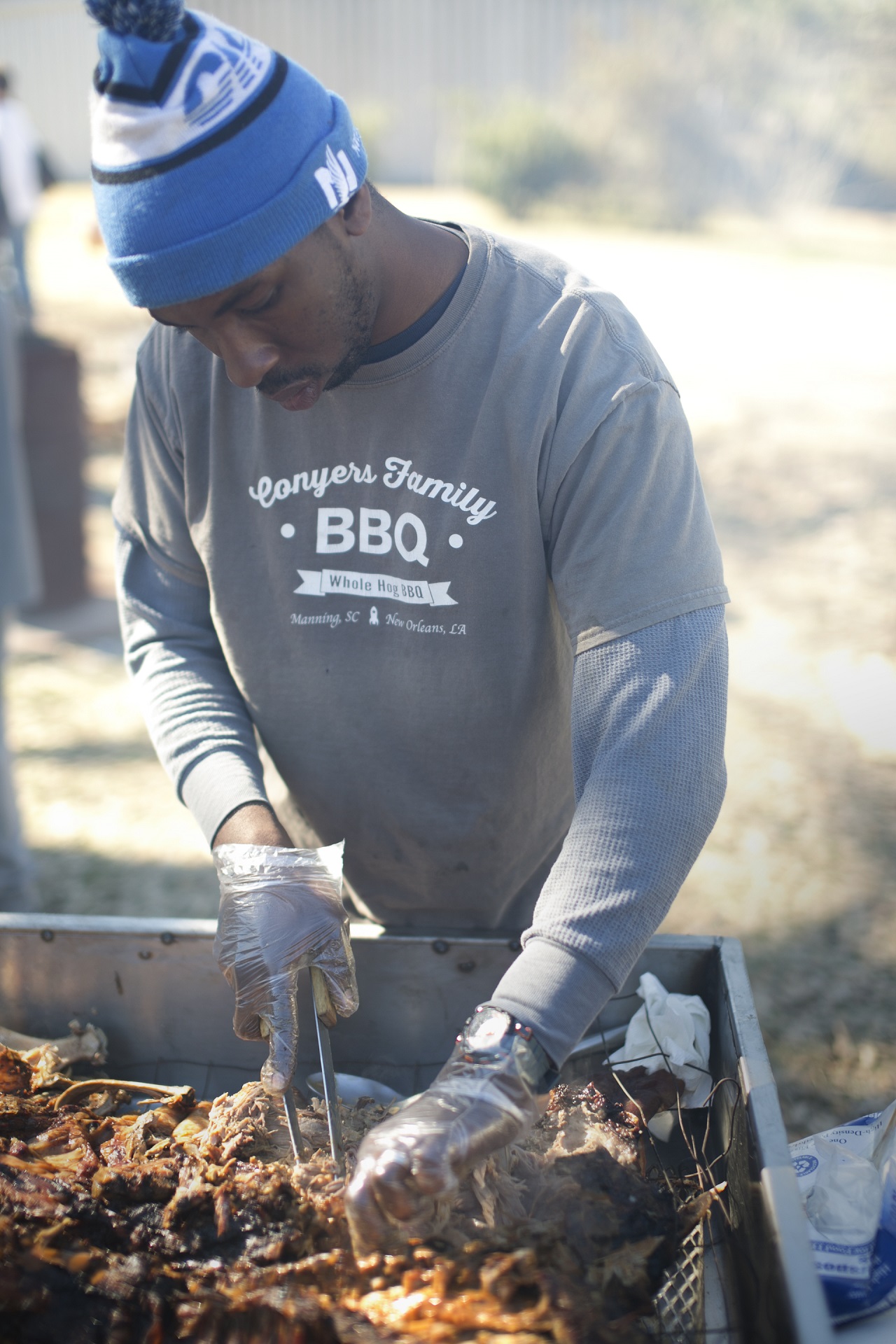The Black Pitmaster Working To Uphold True American Barbecue Traditions
This story is part of an ongoing series in honor of Black History Month on the diversity, roots and evolution of Black cooking and cuisine in America.
When you think of "authentic American barbecue," does your mind automatically wander to summer days outside cooking chicken wings or a slab of ribs on the grill? Or maybe it reminds you of that delicious pulled pork sandwich from your favorite Southern barbecue joint. But for Dr. Howard Conyers, barbecue tells the history of his ancestors and the many Black cooks who pioneered this craft.
"Barbecue for me is cooking the whole hog," says Conyers, an aerospace engineer for NASA. When he's not busy being an actual rocket scientist, he is uncovering the hidden truths behind barbecue.
"When I was young, barbecue was just a way of life," recalls Conyers. "It was an activity that my family and the people of my community always did, but now barbecue has transitioned [into] a unifier of people [for me]."
The engineer was born in rural South Carolina and found that barbecue was a passion from his childhood that he couldn't leave behind. And though they may sound like disparate interests, Conyers has discovered that he's able to apply his science background to the way he approaches the historical facts and methods behind barbecuing.
"I try to verify the techniques that were done in the past and verify [that] they were tried and true. So it required me to go and look at the old processes that have been passed down and verified that it worked," says Conyers.
His research has taken him across the country, sometimes even around the world, sampling different kinds of barbecue while also gathering stories from pitmasters. Conyers has learned that barbecue has been a cultural pastime for the Black community since pre-colonial times, especially in the South. "They were cooking in something called a hole in the ground, which is a trench almost like a shallow grave and that is the same way that my father learned how to cook barbecue," says Conyers.
Barbecuing was mostly used as a way to feed a large group of people for communal affairs, whether it was celebrating a fertile harvest season on the plantation or for religious purposes. African Americans would dig up pits in the ground, fill it with hickory or oak coal and set a whole hog or cow on top of the direct heat to cook. "Every significant cultural celebration in the country, you see African Americans doing those barbecues historically and it kind of lasted throughout the times," explains Conyers.
Though there are modern tools such as smokers that have been developed over the years to help aid the process of cooking meat, Conyers is trying to uphold his ancestor's traditional way of cooking. "I went back and started trying to do things that my ancestors did, whether it was cooking in a hole in the ground or cooking different animals. Whether it was a hog, goat, lamb or cow."
There isn't exactly one way to cook barbecue. Regional barbecue styles differ across the South, from the types of meats cooked to the sauces or marinades used. In the Carolinas, slow cooking whole animals has been the way of life since colonial times. But there are even differences across the state. In eastern North Carolina, they like their pork covered in a tangy vinegar-based sauce while Lexington, North Carolina is all about tomato-based sauces. Beyond North Carolina, it gets even more diverse. If you explore around the Kansas City, Missouri area, you can expect barbecue covered in a thick, sweet sauce, and when you move down to Texas, the beef-based barbecue is likely to be paired with smokey, tomato-based sauces.
Although Black Americans have been barbecuing in their communities for centuries, the barbecue business began getting increased media attention in the 2000s as celebrity chefs set their sights on the craft. "The term pitmaster is the relatively new term that came off of a TV show...That is where you start to hear a lot of white people talk about pitmasters," says Conyers. "[Growing up] I didn't know what a pitmaster was. We always used to use [the words] cook, barbecuer, things like that..."
In 2015, Aaron Franklin, a white chef, gained the honor of being the first pitmaster given an award in the "best chef" category at the prestigious James Beard Awards. Then in 2018, Fox News released an article naming the most influential barbecue pitmasters in America. However, on that list, there was not a single person of color.
The continued whitewashing of barbecue ignited a flame inside of Conyers who decided to really dive deep into the historical side of the craft and bring mainstream awareness to the involvement of African Americans. "But I didn't want to just say that barbecue was just simply a Black thing," explains Conyers. "I wanted to have definitive evidence of how it's Black [and] how Black Americans contributed to it."
Conyers explains that the omission of African Americans in the history of American barbecue comes down to not wanting to truly shed light on the reality of the situation: that enslaved people on plantations did the cooking. He further explains that there are certain nuances of the history of the craft difficult to explain from an observer's point of view and only someone who lived the experience would be able to go into great detail about the sizing of the pits and how many animals were cooked. At the time, it was illegal for enslaved people to read and write therefore, it's hard to find any historical context written by the cooks themselves.
To bring together his findings, Conyers is working on a book, "Black Hand in the Pit," that will share what he has discovered through his barbecue journey through photos and a compilation of essays from people who also share an interest in the barbecue craft.
Currently, Conyers is working with Kingsford charcoal on a fellowship program called "Preserve the Pit" that aims to shine a light on the cultural significance of Black barbecue in America. He'll be one of the mentors in this program, along with other notable barbecuers like Kevin Bludso, Bryan Furman and Rashad Jones. "To see barbecue go forward," says Conyers, "you have to understand the past, but you also need support to understand the future and Kingsford is providing that."
The purpose of this program is to give aspiring barbecue professionals one-on-one mentorship, hands-on training and capital investment to start their own barbecue businesses. Applications for this fellowship are due March 1, 2021.
"I want [people] to understand that when they are eating barbecue, it's a little deeper than the dish itself," said Conyers. "Understand you're enjoying the good, bad and ugly of America through food. Everything about that dish represents and signifies America and it tells the whole story."
.


